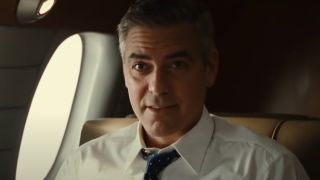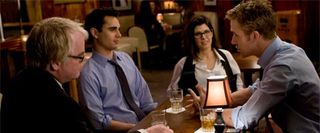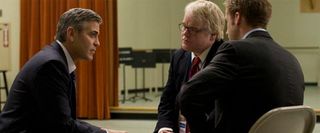Exclusive Interview: The Ides Of March Writer/Producer Grant Heslov

Grant Heslov and George Clooney have been working together for years. In addition to writing Good Night and Good Luck together, the pair both served as producers on the Steven Soderbergh HBO show K Street and they have both produced each other’s directorial efforts, swapping places on The Men Who Stare At Goats and Leatherheads. Now the pair has come back again with their newest film, The Ides of March.
A couple weeks ago I was given the opportunity to sit down one-on-one with Heslov and talk about the new film, which comes out today. Check out the interview below in which he talks about his writing process with Clooney, the complications that come with adapting a play and how they decided that Ryan Gosling was the right actor for the lead role.
This is now the second project that you’ve written with George Clooney. I’m curious about how the two of you work together and did the writing of this movie greatly differ from Good Night and Good Luck.
Well I do all the writing [laughs]. We literally have an office, we go to our office, and we just sort of sit across from each other at a desk and we write it out. There’s no sort of, “He writes dialogue and I write the description.” We really just sort of co-write it together. We hash it out. In this case we wrote, we were adapting from a play, so we sort of had a general idea of what we were going to do. We wrote the scene between Governor Morris and Ryan’s character in the kitchen at the end, we wrote that scene first. So we wrote that scene knowing that this is where everything heads, this is where it all… and then we sort of worked backwards from there.
Was it the same thing as Good Night and Good Luck or was that more constructing the straight narrative?
Good Night and Good Luck was more straight forward because we knocked out the story that we wanted to tell and we wanted to do these three broadcasts, these three big broadcasts, and that one was a little more concise. In terms of differing, no, they were very similar. The experiences were very similar.
When you’re adapting from a play you have a story that comes in script form, which I would assume is much different than a novel. What are the specific challenges that come with that?
CINEMABLEND NEWSLETTER
Your Daily Blend of Entertainment News
Well, plays are plays for a reason. So, you know, they’re very contained, they’re very talky. So you want the essence because we loved a lot of that. You want some of the essence of that, but you can’t have a fifteen page scene in a film, that would just kill it. So that’s a challenge, opening it up. That’s the challenge, to sort of open it up and make it cinematic.
How much changed between the play and the film?
You haven’t seen the play?
I haven’t, no.
George’s character doesn’t exist, the candidate doesn’t exist in the play. So there’s that. And the play only takes place in two or three places: a hotel room, a bar, and a restaurant or an office.
So they never go into the campaign office.
Umm, I’m trying to remember now if they do or not. I don’t recall. But all of the plotting that went on in the film, all the stuff. The play is really just about Ryan’s character and sort of his demise. And in the play he ends up sort of a broken man on stage, and we weren’t interested in that. We wanted a morality tale. We wanted this big sort of morality tale but we also wanted him to win in the end because we wanted him to win at all costs.

Do you see him as sort of an anti-hero?
In this? I didn’t see him when we made it, but as I see some audience response to it, it seems like a little bit that he is.
During your research process, I assumed you did quite a bit of research for this project…
Well George and I worked with Steven Soderbergh on a series for HBO a few years back called K Street, so we were in D.C. for months living there. So that was that was our research.
Was there anything about the process that really took you by surprise?
Nothing took me by surprise, because if you read the news… I’ll tell you what took me by surprise more was how much more fun the republicans were to hang out with than the democrats.
Really?
That surprised me. That was probably the biggest surprise.
Fun in what sense?
They were just more fun to hang out with. They were less uptight and I would have thought the opposite. But it just seemed for fun to hang out with the republicans.
I do also want to ask about the casting process a bit, because I know that when the project was first coming together Chris Pine and Leonardo DiCaprio were suggested for the lead. How was Ryan Gosling chosen?
Well, we always wanted Ryan. We developed the project and Leonardo DiCaprio’s company was on as well because the studio partners up. So we wanted Leo to do it, but we sort of figured that he wasn’t going to do it for a bunch of reasons – mostly schedule but also we were making a very lean, small film and we always just thought that if Leo didn’t do it that Ryan is the guy.
What was it about Ryan?
I think he is the best actor of his generation, you know? And he has the right amount of heart and at the same time sort of toughness that we wanted the character to have.

And beyond Ryan the cast you have for this film is absolutely outstanding – Paul Giamatti, Philip Seymour Hoffman, Marisa Tomei, Evan Rachel Wood. When you were writing the script did you have any of those names in mind?
We thought of Philip Seymour Hoffman, we thought of Giamatti and we thought of Marisa when we were writing. And Evan, George said, “I want Evan Rachel Wood to play the intern. We were very lucky because it doesn’t usually work that way, that you get who you actually want.
So what was your reaction when you first found out they were all on-board?
Well it was cool, but then there was that, “How do we make this work?” because I can’t pay them anything and schedules and everything else, so that’s where the producorial aspect came in. Everybody is doing it for no money and… it was a passion project for everybody.
How fast was the production?
It went fast! It was like four months and we were shooting.
We were talking to Evan Rachel Wood earlier and she was saying that she was playing a small role but her part was spread out over the span of a couple months. Was that a typical thing with all of the actors or was it a special case for her?
Well with Evan it was okay because Evan was like, “I’m on board and I’m not scheduling anything else,” so it was easiest with her. Marisa Tomei was doing a play, she was rehearsing a play, so she had to go back and forth. Giamatti and Phil Hoffman we sort of shot out in like two weeks, relatively quickly. George we had all the time, Ryan we had all the time. Listen, I’ve worked on films that have been much more… when we did Leatherheads with John Krasinski he was doing The Office so we had to shoot around his schedule and stuff. But we’re pretty good about it and we’re pretty sympathetic to it because we’ve both have been actors, we’ve both been in that position where you try and juggle two productions at once.
This film is coming out just as the next presidential race is starting to heat up, which is really just perfect. With that in mind, what do you want people to take away from watching this film?
You know, I don’t know. I think that people are going to read a lot more into what we want them to take from it then what we intended. I think we wanted to make a sort of a solid, dramatic thriller and that politics… we set it in politics because we had this play. We could have set it in big business, we could have set it at Fox. The main thing is that I want audiences to go on and have a good ride. But, I mean, if they sort of take away the idea that politics is a messy business – I mean, everybody knows that anyway, we’re not reinventing the wheel with that – so I don’t know exactly… I would be lying if I told you I knew what I wanted the audience to take away. We purposely left it ambiguous at the end, and I think that helps create discussion and that I like.

Eric Eisenberg is the Assistant Managing Editor at CinemaBlend. After graduating Boston University and earning a bachelor’s degree in journalism, he took a part-time job as a staff writer for CinemaBlend, and after six months was offered the opportunity to move to Los Angeles and take on a newly created West Coast Editor position. Over a decade later, he's continuing to advance his interests and expertise. In addition to conducting filmmaker interviews and contributing to the news and feature content of the site, Eric also oversees the Movie Reviews section, writes the the weekend box office report (published Sundays), and is the site's resident Stephen King expert. He has two King-related columns.
Most Popular






